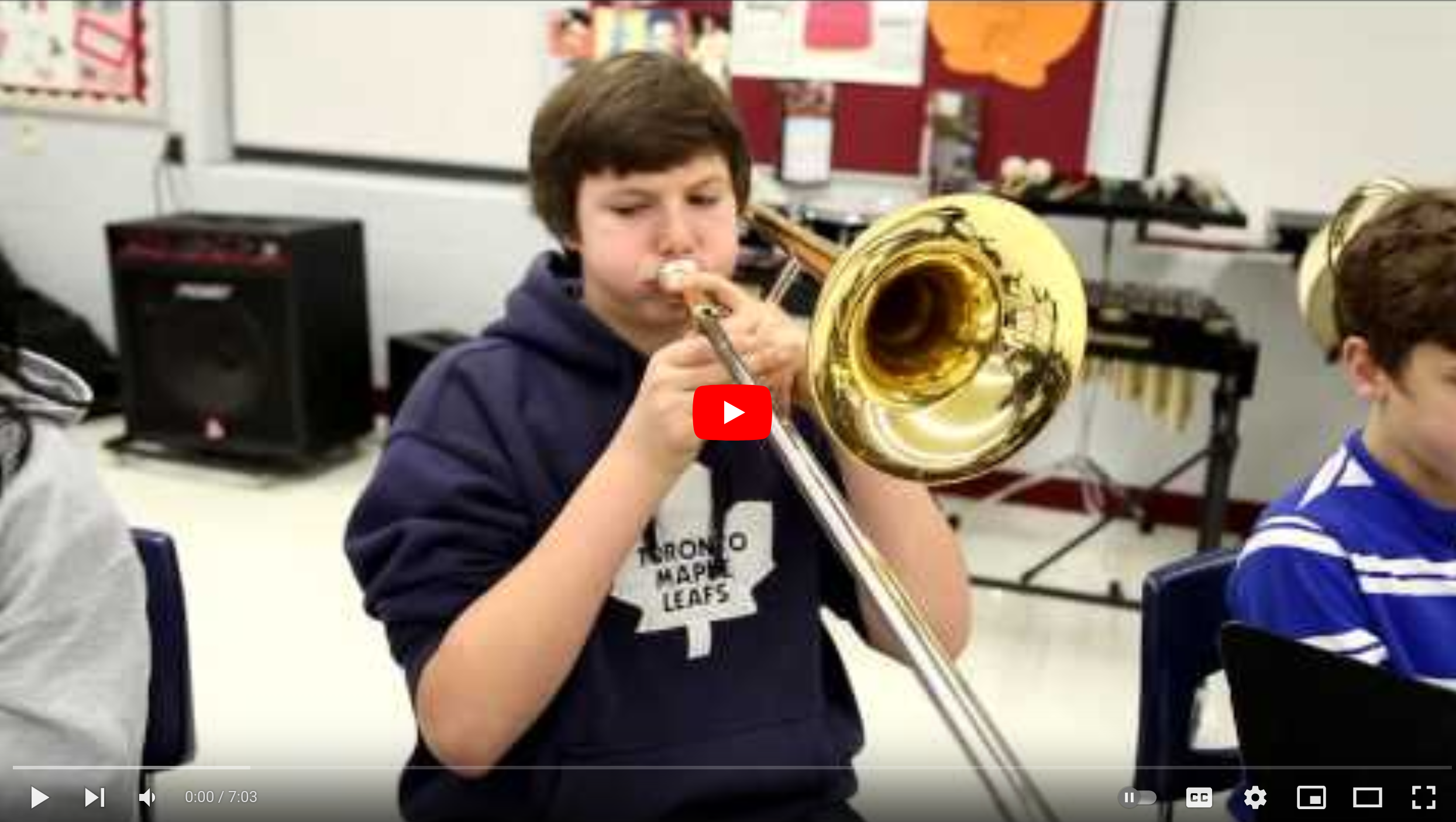News & Announcements
- Details
- Written by Laura Mirsky
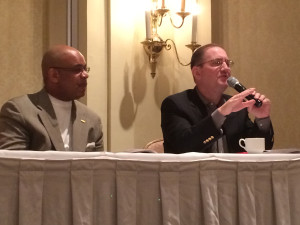 Dr. Joe Roy (r), superintendent of Bethlehem Area School District, discusses the impact of restorative practices at Freedom and Liberty High Schools, while Shannon Mayfield, former principal of William Allen High School in Allentown, Pennsylvania, listens.“After two years of restorative practices, there are no more ‘habitual offenders’ at Liberty and Freedom high schools. And there has been a 50 percent drop in expulsions,” Dr. Joseph Roy, superintendent of the Bethlehem Area School District, told guests at Celebrating Restorative Works, a Restorative Practices Foundation fundraising breakfast in Bethlehem, Pennsylvania, USA, on Sunday, March 30, 2014.
Dr. Joe Roy (r), superintendent of Bethlehem Area School District, discusses the impact of restorative practices at Freedom and Liberty High Schools, while Shannon Mayfield, former principal of William Allen High School in Allentown, Pennsylvania, listens.“After two years of restorative practices, there are no more ‘habitual offenders’ at Liberty and Freedom high schools. And there has been a 50 percent drop in expulsions,” Dr. Joseph Roy, superintendent of the Bethlehem Area School District, told guests at Celebrating Restorative Works, a Restorative Practices Foundation fundraising breakfast in Bethlehem, Pennsylvania, USA, on Sunday, March 30, 2014.
Dr. Roy explained, “With restorative practices, students are staying in school and learning.” Instead of exclusion for misbehavior, the focus is on building relationships and holding students accountable. Liberty and Freedom are the first schools to participate in Bethlehem’s planned district-wide restorative practices initiative, with the IIRP Graduate School’s SaferSanerSchools Whole-School Change Program.
- Details
- Written by Joshua Wachtel
Schools
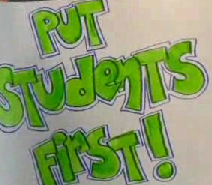 The Discipline Disparities Research to Practice Collaborative, a panel of 26 national experts, present to Congress evidence and recommendations that support restorative practices.
The Discipline Disparities Research to Practice Collaborative, a panel of 26 national experts, present to Congress evidence and recommendations that support restorative practices.
The American Federation of Teachers, an affiliate of the AFL-CIO with 1.5 million members across the US, recently held a summit on Restorative Practices in Schools in Washington, D.C. A leader for the organization argues at Education Week that "Suspensions Should Be Last Resort."
- Details
- Written by Joshua Wachtel
 Liz Burian, who teaches Life Skills and Digital and Fine Arts at CSF Buxmont’s Bethlehem, PA, school, uses circles with students to present and review academic course content, and to maintain positive levels of behavior to ensure a great learning environment.
Liz Burian, who teaches Life Skills and Digital and Fine Arts at CSF Buxmont’s Bethlehem, PA, school, uses circles with students to present and review academic course content, and to maintain positive levels of behavior to ensure a great learning environment.
At the beginning of each class, says Liz, every student identifies an area of behavior that could be a problem — like talking or getting distracted — and says what they’re going to work on that during the class. Liz then relies on the students themselves to help maintain a safe, quiet learning space.
“If you send a student out of class, you get rid of the problem but you actually take your own power away.” Liz says, “As a teacher you have to realize you have a great community in your classroom to support positive behavior, instead of relying on punitive measures.”
- Details
- Written by Joshua Wachtel
In the following video, filmed at the IIRP's 16th World Conference in October 2013 during a plenary panel on Restorative Practices in the Faith Community, IIRP master's candidate Tom Albright discusses Ripple, the ministry he has helped create based on restorative practices and principles.
View a video of Tom Albright wearing another hat, a teacher working in a school-to-work transition program at Bethlehem, Pennsylvania's, Freedom High School.
- Details
- Written by Joshua Wachtel
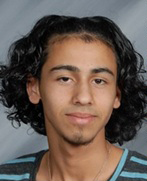 Emmanuel Zayas received a 2014 "Yes I Can" Award from the Council for Exceptional Children.Emmanuel Zayas – Manny – a senior at Freedom High School, recently received a Council for Exceptional Children's 2014 Yes I Can Award for his success transitioning from school to work.
Emmanuel Zayas received a 2014 "Yes I Can" Award from the Council for Exceptional Children.Emmanuel Zayas – Manny – a senior at Freedom High School, recently received a Council for Exceptional Children's 2014 Yes I Can Award for his success transitioning from school to work.
Manny's emotional support case manager, Deanna Webb, has worked with him since he was in seventh grade and attests to the great progress he has made. She said, "Manny's emotional intelligence has really increased. He sees how his behaviors have affected others. He's now a leader with his peers."
Tom Albright, who offers career counseling and job placement and coordinates a school-to-work transition program at Freedom, has worked extensively with Manny, his family and his employer over the past year. Albright said that when Manny first joined his class, he was reluctant to get involved in the restorative circles that Albright employs to engage is students in helping each other deal with issues they're facing in school, at home and at work. (In the video, Manny refers to the "fishbowl," a special type of circle that can be useful for problem-solving.)
- Details
- Written by Joshua Wachtel
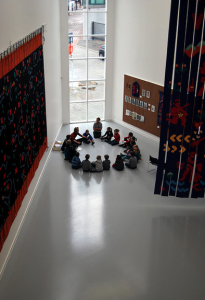 Photo by Tup Wanders at Flickr Creative Commons.The International Institute for Restorative Practices (IIRP) is pleased to announce a partnership with the Center for Social Organization of Schools at the Johns Hopkins University School of Education to conduct a three-year randomized field trial evaluation of the IIRP’s SaferSanerSchools Whole-School Change Program. The study will establish the impact of school-wide restorative practices on reducing disparities in discipline and overall rates of suspensions, arrests and expulsions in high poverty-area middle and high schools that also have significant proportions of students of color.
Photo by Tup Wanders at Flickr Creative Commons.The International Institute for Restorative Practices (IIRP) is pleased to announce a partnership with the Center for Social Organization of Schools at the Johns Hopkins University School of Education to conduct a three-year randomized field trial evaluation of the IIRP’s SaferSanerSchools Whole-School Change Program. The study will establish the impact of school-wide restorative practices on reducing disparities in discipline and overall rates of suspensions, arrests and expulsions in high poverty-area middle and high schools that also have significant proportions of students of color.
This study, supported by a million-dollar grant from The Atlantic Philanthropies, aims to build the evidence base of restorative practices as an effective alternative to zero tolerance. During the three-year study period, 15 middle and high schools in Chicago, Illinois; Los Angeles, California; Philadelphia, Pennsylvania; Boston, Massachusetts; Washington, D.C.; Brooklyn, New York; San Antonio, Texas; and Baton Rouge, Louisiana, will receive school-wide restorative practices training and consultation. Uniquely, the study will evaluate the combined and value-added impacts of instituting restorative practices in schools along with Diplomas Now, an ongoing whole-school reform effort that strengthens learning environments and enhances student supports, guided by an early warning system.
- Details
- Written by Laura Mirsky
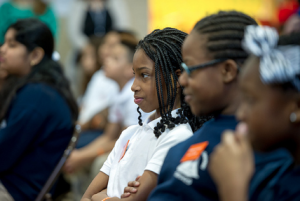 Photo by Maryland GovPics at Flickr Creative CommonsDisparities in out-of-school suspension and expulsion by race, gender and sexual orientation are a critical issue in our schools.
Photo by Maryland GovPics at Flickr Creative CommonsDisparities in out-of-school suspension and expulsion by race, gender and sexual orientation are a critical issue in our schools.
The Discipline Disparities Research to Practice Collaborative, a panel of 26 national experts — researchers, educators, advocates and policy analysts — presented to Congress on March 13 the most comprehensive compilation and analysis of research on exclusionary discipline ever attempted. Read the papers.
- Details
- Written by Joshua Wachtel
Health Sciences High and Middle College, a public charter school based in San Diego, California, USA, is located in the City Heights neighborhood, one of the most diverse neighborhoods in the city. The high school was founded seven years ago and now has about 550 students; the middle school is in its first year with 130 students. About 60 percent of students are Hispanic, with high diversity among the remaining 40 percent. Students come from wealthy to very poor families and everything in between. One of the unique features of the school is that high school students conduct weekly internships, mostly at hospitals. Beginning about 3 1/2 years ago all staff have been systematically trained in restorative practices through the International Institute for Restorative Practices (IIRP) and have implemented restorative practices school-wide.
In this article, Jeff Bonine, principal of the middle school, and Dominique Smith, school social worker for the middle and high schools, with IIRP writer Joshua Wachtel, describe how restorative practices form an integral part of the structure that Health Sciences has established for its middle school program. The article includes concrete examples of the ways teachers and staff are using restorative practices and how it works.
Administrators and staff at Health Science High and Middle College are so excited about restorative practices that they are hosting an IIRP Basic Restorative Practices professional development event April 22-25, 2014, to spread the word about the practices to the public.
- Details
- Written by Kristin Oakley
Peel School District in Ontario, Canada, demonstrates how restorative practices can be used as an integral part of teaching and learning.
- Details
- Written by Joshua Wachtel
Schools
Robert Koehler always writes eloquently as he seeks solutions to hard problems. In his latest piece on restorative justice, "Beyond Our Broken Dreams," he reports, "So far this year, the students [at Uplift Community High School in Chicago, Illinois, USA] have held 16 [restorative] conferences, 15 of which have ended in agreements that were successfully completed; 129 days of suspension were prevented."
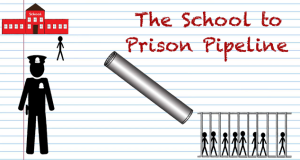 In a New York Times Op-ed, Robert Ross and Kenneth Zimmerman argue for "real discipline in school," aka restorative practices, which they place in the context of the school-to-prison pipeline and the new national guidelines on discipline in schools.
In a New York Times Op-ed, Robert Ross and Kenneth Zimmerman argue for "real discipline in school," aka restorative practices, which they place in the context of the school-to-prison pipeline and the new national guidelines on discipline in schools.
This professional and detailed 14-minute video from the Center for Documentary Studies at Duke University deconstructs the school-to-prison pipeline and points to alternatives, like restorative practices.

Restorative Works Year in Review 2024 (PDF)
All our donors are acknowledged annually in Restorative Works.

